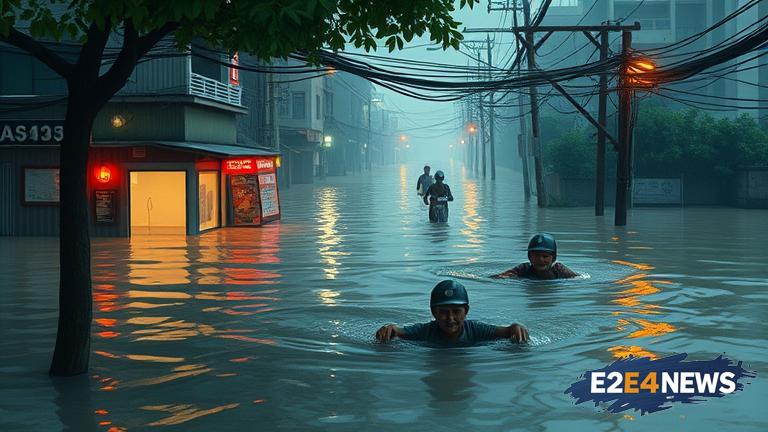Typhoon Kajiki made landfall in Vietnam, bringing with it powerful winds and heavy rainfall that has resulted in the deaths of at least 3 people. The capital city, Hanoi, has been severely affected, with floodwaters inundating homes and businesses, and thousands of residents forced to evacuate. The typhoon’s impact has been felt across the country, with reports of widespread damage to infrastructure, agriculture, and property. The Vietnamese government has scrambled to respond to the disaster, deploying emergency services and aid to affected areas. The death toll is expected to rise as rescue efforts continue, with many people still missing and unaccounted for. The typhoon’s powerful winds have also caused significant damage to the country’s power grid, leaving thousands without electricity. The flooding has also disrupted transportation, with many roads and highways impassable due to the high water levels. The Vietnamese military has been deployed to assist with rescue efforts, using boats and helicopters to reach stranded residents. The international community has also offered support, with aid and assistance pouring in from around the world. The typhoon has also had a significant impact on the country’s economy, with many businesses forced to close and trade disrupted. The agricultural sector has also been severely affected, with crops destroyed and livestock killed. The government has promised to provide support to affected farmers and businesses, but the road to recovery is expected to be long and difficult. The typhoon has also raised concerns about the country’s preparedness for natural disasters, with many questioning the effectiveness of the government’s response. The Vietnamese people are known for their resilience, but the impact of Typhoon Kajiki will be felt for a long time to come. The government has announced plans to provide emergency aid to affected areas, including food, shelter, and medical care. The international community has also pledged to support the relief efforts, with donations and aid pouring in from around the world. The typhoon has also highlighted the importance of disaster preparedness and mitigation, with many calling for increased investment in infrastructure and emergency services. The Vietnamese government has promised to review its disaster response plans and make improvements to prevent similar tragedies in the future. The people of Vietnam are coming together to support each other, with many volunteering their time and resources to help with the relief efforts. The typhoon has also brought attention to the issue of climate change, with many experts warning that such extreme weather events will become more frequent and intense in the future. The Vietnamese government has pledged to take action to reduce the country’s carbon footprint and mitigate the effects of climate change. The road to recovery will be long and difficult, but with the support of the international community and the resilience of the Vietnamese people, the country will rebuild and recover from the devastating impact of Typhoon Kajiki.
